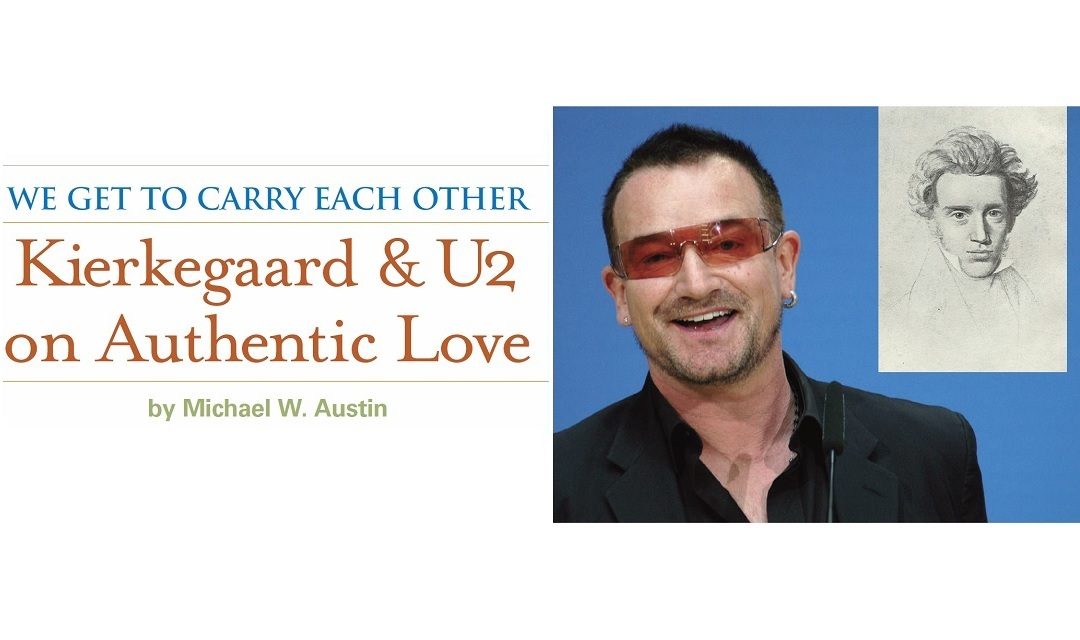This article first appeared in the CHRISTIAN RESEARCH JOURNAL, volume 35, number 04 (2012). Note: This is part of our ongoing Philosophers Series.
The death of his mother deeply affected this man and the substance of his writings. He became disenchanted with organized religion, harshly criticizing it while at the same time embracing a deep personal faith in God. In his writings, he often uses layers of irony and imagery to illustrate deep truths about life, the human condition, and the struggle between faith and doubt. He also writes in order to awaken, provoke, and move people to act. He explores love in its various forms—the love between parents and children, romantic love, and divine love.
Fans of U2 will recognize this brief description of the life and work of Bono, the band’s lead singer. However, this description also aptly applies to the life and work of another man.
Søren Kierkegaard, the influential nineteenth-century Danish philosopher (1813–1855) has other things in common with U2’s frontman. Both men have used their creative energies to explore issues of morality, faith, and love in thought-provoking ways. In the 1990s, Bono took to dressing up as the devilish character Macphisto in order to illustrate what stardom can do to the rock star. Bono has created other unique personas such as the Fly and Mirrorball Man, and has written a song—“Until the End of the World”—from the perspective of Judas, the betrayer of Christ. Kierkegaard also writes from a variety of perspectives, using different characters in the quest to understand humanity and God. Both men emphasize that love is more than mere words or feelings. Consider the following, taken from Bono’s appearance on Oprah in September of 2002:
After LiveAid [in 1985], I went there [Africa] to work with my wife. We spent a month in Ethiopia in the middle of the famine. I saw stuff there that reorganized the way I saw the world. I didn’t know quite what to do about it. You can throw pennies at the problem, but at a certain point, I felt God is not looking for alms, God is looking for action. You can’t fix every problem, but the ones that you can, we have to…distance cannot decide who is our neighbor to love. Love thy neighbor. We can’t afford not to. The world is too close.
Kierkegaard would echo these sentiments. For him, authentic love is the love of our neighbor, which essentially means all people. This authentic love is not a mysterious feeling, an introspective mood of the soul, or an empty promise. Rather, authentic love is “sheer action.”1 We know we authentically love when we act for the sake of others. Kierkegaard brings this understanding of love into our more intimate relationships as well, including the marriage relationship. Many of Kierkegaard’s thoughts on love can be found in the music of U2. Bono and Søren both have something to tell us about the nature of authentic love and its contribution to a good and happy life.
THE PROBLEM: POETIC LOVE IS SELF-LOVE
In his book Works of Love, Kierkegaard tells us that love, including erotic love, comes from deep within us, from the heart. For him, erotic love includes, but is not limited to, sexual love. We use the phrase “romantic love” to capture what he has in mind. According to Kierkegaard, the poetic understanding of love, that is, the love praised in literature and music, is a counterfeit version of love. It is a love of mere words that neglects action. This poetic understanding of love is based on preferences for the person who is the object of such love. Poets sing the praises of romantic love as preferential love, as loving one person in distinction from all others. This understanding of romantic love focuses on the intensity of the emotions and desires that surround this type of love. Kierkegaard is quite wary of this.
Why is Kierkegaard wary of the poet’s view of love? If love is founded only on our preferences, feelings, and desires, a danger lurks. The danger is that such love is only a form of self-love, rather than a love centered on the well-being of the one we profess to love. How could this be? Kierkegaard answers this question for us:
Now, to admire another person is certainly not self-love, but to be loved by the one and only object of admiration, must not this relationship turn back in a selfish way to the I which loves—loves its other I?
Is it not an obvious danger for self-love to have a one and only object for its admiration when in return this one and only object of admiration makes one the one and only object of his own love?2
The danger is that instead of loving my spouse in such a way that her well-being is my ultimate concern, I instead love her expecting or even demanding something in return. I love her so that I’ll be rewarded with her love, her care, and her affection. This is a love motivated out of concern for the self, rather than for the other. Such love is inauthentic, according to Kierkegaard, and so fails to produce true happiness.
KIERKEGAARD’S SOLUTION: LOVE AS A MORAL DUTY
Kierkegaard’s solution is not to purge love of feeling or desire. Rather, he wants to ground romantic love in something that is more lasting and stable. For him, romantic love must be made secure by basing it in God’s love. Only then is it authentic, and only then does it produce a secure and lasting happiness.
To do this, Kierkegaard believes that we must conceive of love as a moral duty. Specifically, loving my spouse should be seen as a specific and unique way of fulfilling my duty to love my neighbor. Only if love is a duty is it secure, resting on a foundation that does not change. Poetic understandings of romantic love, however, as Kierkegaard understands it, can cause despair or even turn into hate due to changes in me or in the one I love. This type of love “loses its ardour, its joy, its desire, its originative power, its living freshness.”3 This experience is all too familiar. The initial passion and intensity of a romantic relationship tends to wane over time. People talk about “falling out of love” with vague explanations; marriages are ended because of this. Kierkegaard explains that love of this sort dies out and can even turn into hate, because if my love is based on my preferences or on traits in the one whom I love, and my preferences or the traits of my beloved change, my love then changes. Poetic love is rooted in the temporal, and because of this it is extremely vulnerable.
Love as a duty, however, is rooted in the eternal, in God, and so it is firmly grounded. It does not change because it transcends preferences, feelings, and desires. God, unlike our emotions, is unchanging, according to Kierkegaard. God is a secure foundation for love. Kierkegaard also thinks that authentic love involves a renunciation of selfishness and a commitment to perseverance. Husband and wife must both retain an attitude of self-renunciation, and endure in this over time. This is often very difficult to do, but this is the nature of authentic love.
However, there is still a place for the sensuous. The theme of the sensuous aspect of love runs through much of U2’s music as well. Songs like “Desire,” “Hawkmoon 269,” “The Sweetest Thing,” and “Wild Honey” deal with the sensuous aspects of romantic love. Neither U2 (unsurprisingly) nor Kierkegaard (perhaps surprisingly) eliminate or downplay the sensuous aspects of romantic love.
For Kierkegaard, in order to be authentic, romantic love must be transformed by divine love. Kierkegaard, like Bono, speaks of divine love and romantic love together, as components of a good life. Through marriage, the divine has taken romantic love and made it a matter of conscience. This is not intended to abolish the impulses, passions, and feelings that are a part of romantic love. Instead, God makes a change deep within the spouses so that they are committed to each other as a matter of conscience. They have undertaken a duty to love one another.
Romantic love is preserved and transformed when it is grounded in the divine command to love. When we love in this way, we still enjoy the feelings and the fulfillment of our desires, but without resting the love relationship on a shaky foundation. Desires and emotions change, but if we set our love on a commitment grounded in God, who is eternal and unchanging, then our love is no longer vulnerable to the changing tides of emotion.
Kierkegaard also believed that “being related to God is the greatest blessedness,”4 and so he contends that situating all love in relationship to God will yield in us the deepest happiness. This is why Kierkegaard tells us that to love another is to help him or her love God. This is love’s ultimate aim. It is not achieved by coercion, but rather by taking it upon ourselves to obey God in love. For Kierkegaard, this is a crucial part of the recipe for true human happiness.
BONO’S SONG: A MAN AND A WOMAN
In the song “A Man and a Woman” from the album How to Dismantle an Atomic Bomb, Bono confesses that “I could never take a chance, of losing love to find romance, in the mysterious distance, between a man and a woman.” In this song, there are striking parallels with a Kierkegaardian understanding of married love.
What does it mean to “never take a chance of losing love to find romance”? It seems that Bono is recognizing that the authentic love present within a strong marriage relationship cannot be had through a mere romantic affair. Such thinking is foreign to the self-centered person, where the goal of pleasure reigns supreme and commitment appears to be a threat to this goal. Why commit to one person, when a variety of self-gratifying pleasurable experiences can be had with many different people? Bono, however, puts it this way: “True love never can be rent; but only true love can keep beauty innocent.”5
Those who truly seek to follow Christ, according to Kierkegaard, understand that committed married love is valuable for human existence in ways that the self-centered person cannot experience or understand. We shouldn’t trade authentic love for an inferior counterfeit.
What is so good about authentic love? Love as a duty is a love that is free. It does not change when the object of love changes. It is rooted in the eternal, in God, and so it is firmly grounded. Because of this, Kierkegaard makes this claim:
You ought to preserve the love and you ought to preserve yourself and in and by preserving yourself to preserve the love. There where the merely human wants to storm forth, the command still holds; there where the merely human would lose courage, the command strengthens; there where the merely human would become tired and clever, the command flames up and gives wisdom. The command consumes and burns out what is unsound in your love, but through the command you shall be able to kindle it again when humanly considered it would cease.6
The poet’s love can fail in numerous ways. On our own, we fail to persevere, we lose courage, we tire of our beloved, and feel like moving on to someone else. And yet authentic love binds us together. It gives us the courage, strength, and wisdom to hold on to our beloved when love’s counterfeits would fail. Love is better than mere romance.
STUCK TOGETHER WITH GOD’S GLUE
Kierkegaard believes that if a man and a woman are truly committed to one another in Christ, if they are “stuck together with God’s glue,”7 then they can be free of the anxiety and despair that poetic love produces. In authentic love, we get to carry each other (to again reference a U2 song8), and we are one. As Kierkegaard envisions it, love is a triangular relationship between three persons: husband, wife, and God. The spouses help each other to be truly happy, which means that they help each other to love God. In this relationship and in this purpose, the three are one.
Bono and Kierkegaard attempt to awaken us to two truths about authentic love, in all of its forms. As human beings, we need authentic love, and, as human beings, we need to love authentically. However, the Danish philosopher and the Irish rock star would both urge us to remember that a mere awakening is not enough. These truths must be lived.9
Michael W. Austin is associate professor of philosophy at Eastern Kentucky University, where he specializes in ethics. His most recent book is Being Good: Christian Virtues for Everyday Life (Eerdmans, 2012).
NOTES
- Søren Kierkegaard, Works of Love, trans. Howard and Edna Hong (London: Collins, 1962), 106.
- Ibid., 67.
- Ibid., 50.
- Ibid., 134.
- “A Man and a Woman,” How to Dismantle an Atomic Bomb.
- Kierkegaard, 57.
- Stuck Together with God’s Glue was the name of a 1990 album by the Irish rock band Something Happens. U2 later employed the phrase in their song “Staring at the Sun,” on their 1997 album Pop.
- “One,” from the 1991 album Achtung Baby.
- A version of this article originally appeared in Philosophy Now 64 (November/December 2007): 14–17.










